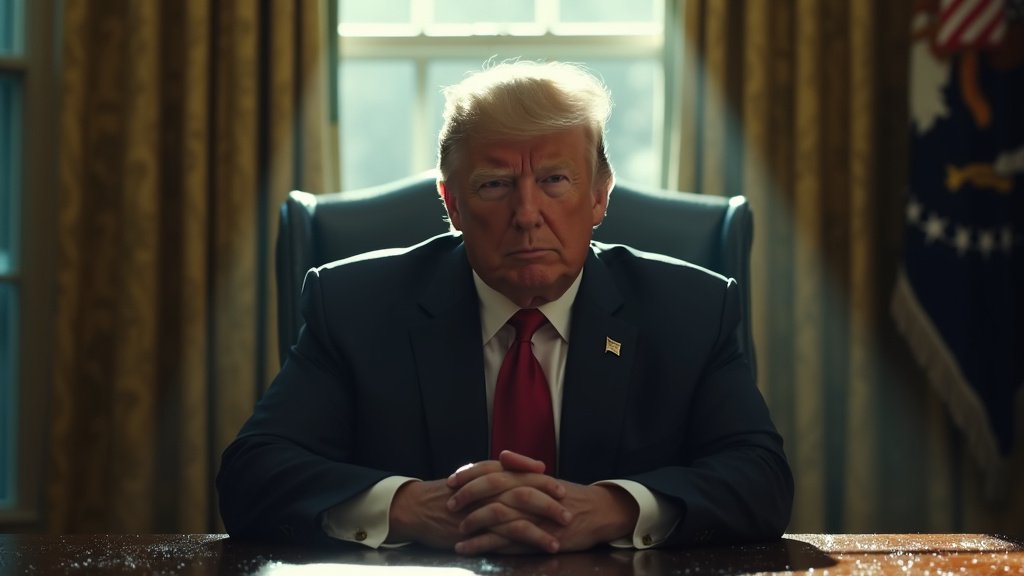In a notable political development, former President Donald Trump has publicly addressed actions taken by the current administration, specifically commenting on President Joe Biden’s recent exercise of the presidential pardon power. Trump’s remarks have centered on the individuals receiving these pardons, framing them within the context of their perceived opposition to him and his political agenda.
Sources close to the former president indicate that his reaction is rooted in the belief that the pardons benefit individuals he views as adversaries. This perspective underscores the intensely personal and often adversarial nature of contemporary American politics, particularly between the current and former occupants of the Oval Office. The commentary from Trump highlights a perception that executive actions, such as pardons, are not merely legal or humanitarian gestures but can also be employed in ways that carry significant political weight and implications for rivals.
The Reported Reaction
Mr. Trump’s response to President Biden’s pardons has been widely reported across various media outlets. His commentary suggests a focus on the identities of the recipients, interpreting the pardons through the lens of political alignment or opposition relative to his own political orbit. This immediate and public reaction signals the importance placed on executive actions by political figures, especially when those actions could be perceived as impacting the political landscape.
The nature of Trump’s reaction, as described, indicates a strategic framing of the issue. By casting the pardon recipients as his “enemies” or “opponents,” he positions the pardons not as standard acts of executive clemency but as potentially politically motivated moves by the current administration aimed, perhaps indirectly, at figures relevant to past or future political contests involving Trump.
Implications for Political Strategy
The original summary of this development noted that Trump discussed how Biden’s pardons affect his “plans against opponents.” This phrasing suggests a link between the executive actions taken by the sitting president and the strategic considerations of a potential political rival.
Analyzing this point requires understanding the dynamic between political opponents. Presidential pardons, while granted under specific legal criteria, can be politically charged, especially when they involve individuals who have been involved in politically sensitive cases or have connections to past administrations or figures. A pardon granted to someone perceived as an opponent could be seen through multiple political lenses – as an attempt to rectify perceived injustices, as a signal of differing values regarding law enforcement and prosecution, or even as a strategic move to empower or protect individuals who might otherwise face legal impediments.
For Mr. Trump, the pardons could be seen as affecting his plans in several ways. If the pardoned individuals were involved in matters critical to his past political narratives or legal challenges, their clemency might alter the trajectory of those narratives or remove potential vulnerabilities for his opponents. Alternatively, Trump’s reaction could be part of a broader strategy to keep focus on perceived political bias within the justice system or the actions of the current administration, framing such pardons as evidence of a politically motivated agenda against him or his allies.
Analyzing Current Political Dynamics
This exchange provides insightful analysis into the current political dynamics in the United States. The relationship between a former president, particularly one who maintains significant influence and may seek a return to office, and the incumbent is inherently complex and often marked by tension. Executive actions like pardons become points of interest, scrutinized for their potential political implications.
The dynamic highlighted here involves not just policy or legal differences but a fundamental clash between perceived political factions. Trump’s characterization of the pardons and their recipients reflects a political environment where actions are frequently interpreted through the lens of partisan conflict and personal rivalries. This contributes to a political climate where trust between opposing sides is low, and actions by one side are often viewed with suspicion by the other.
The analysis further suggests that this episode is symptomatic of a broader trend in current political dynamics: the weaponization of executive power in rhetorical battles. By reacting strongly and framing the pardons as impacting his opponents, Trump leverages the action to reinforce his narrative about being targeted by political adversaries and to galvanize his base.
Broader Context of Executive Clemency
Presidential pardons are constitutional powers intended for various purposes, including offering second chances, correcting perceived injustices, or promoting national unity. However, they have historically also been controversial and subject to scrutiny, particularly when they appear to benefit political allies or associates.
Mr. Biden’s pardons, in this context, are being viewed through the highly charged atmosphere of post-presidency political maneuvering and potential future election cycles. The reaction from Mr. Trump underscores how even routine (or perhaps specific, depending on the individuals pardoned, though details were not provided in the source) applications of executive clemency can become integrated into the ongoing political narrative and strategic positioning of major political figures.
In conclusion, Donald Trump’s reported reaction to President Biden’s pardons, specifically his framing of the recipients as his opponents and the discussion of how these pardons affect his plans, offers a significant insight into the current state of American political dynamics. It highlights the intense rivalry between the former and current administrations, the strategic use of language to frame political actions, and the ways in which executive powers can become focal points in ongoing political battles and strategic considerations against rivals. The episode serves as a clear illustration of the complex interplay between legal authority and political strategy in the contemporary political landscape.











